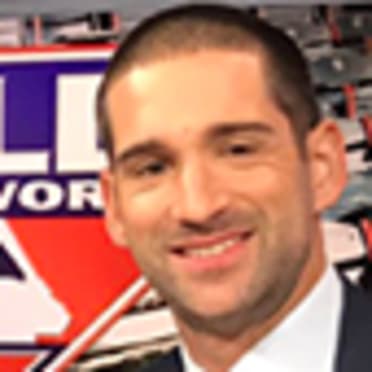Pipeline Q&A: Braves prospect Shea Langeliers
NORTH PORT, Fla. – Shea Langeliers was the Braves’ first-round pick in the 2019 MLB Draft, selected with the No. 9 overall pick out of Baylor University. The highest-drafted catcher by Atlanta since they took Tyler Houston with the No. 2 overall pick in 1989, Langeliers was regarded as the best defensive catcher and posted a .908 OPS with 10 home runs as a junior, despite missing time due to a broken hamate bone in his hand. Making his pro debut with Class A Rome after signing, the Braves’ No. 5 prospect (No. 70 on MLB Pipeline's Top 100 Prospects list) threw out 41 percent of basestealers and recorded a .992 fielding percentage in 42 games behind the plate.
MLB Pipeline: Before you were even drafted by the Braves, you went off in a NCAA regional elimination game against Nebraska Omaha, going 5-for-6 with three home runs, a double and an NCAA tournament-record 11 RBIs. When you came to the plate for the final time, chasing four home runs, that had to have been in your head a little bit, right?
Langeliers: Maybe a little bit. I tried not to think about it as much as I could. I was just trying to take it all in, because I knew that at some point my college career was going to come to an end. I was playing with those guys and trying to have fun—but, yeah, it kind of crept into my head a little bit.
MLB Pipeline: So … did your teammates give you crap when you came back to the dugout or what?
Langeliers: Yeah. I mean, I struck out looking. I didn’t even swing at it. So, yeah, I caught a little crap for that.
MLB Pipeline: Did you know the Braves were going to take you in the first round? And did you know they might take you as high as they did?
Langeliers: I wouldn’t say that I knew they were going to take me, but I knew they had some interest. We’d had meetings during the season and stuff like that. At the end of the day, I’m just really happy to be here and have an opportunity to keep playing.
MLB Pipeline: I noticed you have a locker here next to Braden Shewmake, a guy you played with on the USA Baseball Collegiate National Team. How cool is it that you guys get to experience the next part of your careers together?
Langeliers: It’s awesome, especially at the beginning, knowing somebody like Shew. As good of friends as we are, it kind of just made that transition easier, being able to be close to and talk to somebody. You saw him last summer, he jumped up to Double-A almost immediately.
MLB Pipeline: You were considered the best defensive catcher in last year’s Draft. At what point in your career did you realize that you were just nasty behind the plate?
Langeliers: When I first started catching during my sophomore year in high school, I was more of a catch-and-throw guy, and I came to the conclusion that I needed to take the next step with my receiving and blocking -- kind of learn how a game flows and being able to call a game and work with a pitching staff. My senior year was I first started noticing that I was good in other areas, not just catch and throw.
MLB Pipeline: I know it’s still early in your career, but what would you say is one big thing you’ve implemented in your defensive game that you’ve learned since joining the Braves organization?
Langeliers: Calling a game using scouting reports on the other team. Last summer I was working with [Rome pitching coach Kanekoa Jacob Texeira], going over the opponent’s lineup every game -- their hot zones, counts, runners in scoring position. At the beginning, it was kind of overwhelming with all the information we had that I had to keep track of, but as you keep doing it you get used to it. I would say thinking-wise, with game planning, I’ve taken a step towards where I want to be.
MLB Pipeline: How much do you feel that knowledge and the way you think as a catcher helps you as a hitter?
Langeliers: I would say it definitely puts into perspective what the other team is trying to do to you, because obviously as a hitter you know your hot/cold zones, which pitches you hit well and which pitches you don’t. So I think it gives you perspective on how they might work you for that game.
MLB Pipeline: Not only are you here in big league camp, but you went deep in your second game. How special was that for you? Has it sunk in yet?
Langeliers: When I hit it, I didn’t think I hit it high enough to go. It was really cool -- it was kind of a surreal moment. I really don’t know how to describe it. It was just really cool.
MLB Pipeline: What’s one thing you want to accomplish this year, a goal you have for your first full season?
Langeliers: Game planning and pitch receiving. That’s my biggest focus right now catching-wise, framing pitches and stealing strikes, because that part of the game is huge You catch 150-plus pitches a night; maybe have to block 5-10; maybe have to throw once. So you have to catch more pitches than anything else, and that’s a really important part of the game. By stealing strikes your saving your pitcher’s pitches and ultimately keeping them healthy throughout the year.
MLB Pipeline: So, you’re not in favor of robo-umps, I take it?
Langeliers: Well, the way I’m working right now, probably not.



